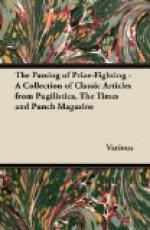Independently of the sensation made in the City by the new glory that has fallen upon the ninth of November (it is said that Sir PETER LAURIE has been so rapt by the auspicious coincidence, that he has done nothing since but talk and think of “the Prince of Wales”—that on Wednesday last he rebuked an infant beggar with, “I’ve nothing for you, Prince of Wales")—independently of the lustre flung upon the new Lord Mayor and the Lord Mayor just out—who will, it is said, both be caudle-cup baronets, the occasion has given birth to much deep philosophy on the part of our contemporaries—so deep, that there is no getting to the end of it, and has also revived much black-letter learning connected with the birth of every Prince of Wales, from the first to the last—and, therefore, certainly not least—new-comer.
An hour or so after George the Fourth was born, we are told that the waggons containing the treasure of the Hermione, a Spanish galleon, captured off St. Vincent by three English frigates, entered St. James’s street, escorted by cavalry and infantry, with trumpets sounding, the enemy’s flags waving over the waggons, and the whole surrounded by an immense multitude of spectators. Now here, to the vulgar mind, was a happy augury of the future golden reign of the Royal baby. He comes upon the earth amid a shower of gold! The melodious chink of doubloons and pieces of eight echo his first infant wailings! What a theme for the gipsies of the press—the fortune-tellers of the time! At the present hour that baby sleeps the last sleep in St. George’s chapel; and we have his public and his social history before us. What does experience—the experience bought and paid for by hard, hard cash—now read in the “waggons of treasure,” groaning musically to the rocking-cradle of the callow infant? Simply, the babe of Queen Charlotte would be a very expensive babe indeed; and that the wealth of a Spanish galleon was all insufficient for the youngling’s future wants.




